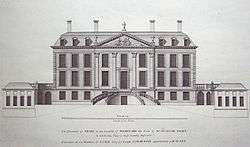Paul Foley (ironmaster)

Paul Foley (1644/5 – 13 November 1699), also known as Speaker Foley, was the second son of Thomas Foley of Witley Court,[1] the prominent Midlands ironmaster.
Ironmaster
He took over his father's ironworks in and around the Forest of Dean in the early 1670s and continued them until 1685 when he let them to John Wheeler and Richard Avenant, who had managed ironworks for his brother Philip Foley. In 1692, the two brothers entered into a partnership with these managers and John Wheeler's brother, Richard. This lasted until after Paul's death.[2]
Gentleman

Paul Foley had the resources from his father and the profits of his ironworks to buy himself a substantial estate around Stoke Edith in Herefordshire, part of which still belongs to a descendant. Important purchases included Stoke Edith from the trustees of Sir Henry Lingen in 1670 (made by his father),[3] and other property from Sir Thomas Cooke in 1683.[4] He rebuilt the house at Stoke Edith and laid out formal gardens and a park (which he had a royal licence to empark.[3][5]
Politician
Paul Foley was elected M.P. for Hereford in 1679. He was elected again for the same seat in 1689.[6] He actively campaigned for the exclusion of the Duke of York from the throne. He was imprisoned at the time of the Rye House Plot and again during the Monmouth Rebellion. However, James II later favoured him during his own later difficulties. During the reign of William III took an anti-court position, establishing Country Whigs with his nephew Robert Harley. During the early 1690s, he sat on several important Parliamentary committees, including being a commissioner of accounts. He was elected Speaker of the House of Commons in 1695, a post he held until his death.[5] He was (like the Harleys and his elder brother Thomas) a Presbyterian and used his patronage rights in the church to appoint clergy of that persuasion to churches.[7]
Family
He married Mary daughter of Alderman John Lane of London. Their eldest son was Thomas Foley. His younger son Paul,[1] was also briefly an MP.[6]
References
- 1 2 Burke's Peerage
- ↑ Schafer, R. G. (1971). "Genesis and Structure of the Foley 'Ironworks in Partnership' of 1692". Business History. 13: 19. doi:10.1080/00076797100000002.
- 1 2 Stoke Edith Park, Hereford, England. Parks and Gardens UK
- ↑ Archenfield Archaeology Ltd, Swan House, Tarrington, Herefordshire: archaeological monitoring and building recording (2001), 5, citing Herefordshire Record Office, E12/IV/163/5 Archaeological Data Service.
- 1 2 Newton E. Key, 'Foley, Paul (1644/5–1699)’, Oxford Dictionary of National Biography, Oxford University Press, Sept 2004; online edn, May 2008 , accessed 1 September 2009
- 1 2 Leigh Rayment's Historical List of MPs
- ↑ John Trevor Cliffe, The Puritan gentry besieged, 1650–1700 (1993), pp. 103–8.
| Political offices | ||
|---|---|---|
| Preceded by Sir John Trevor |
Speaker of the House of Commons 1695–1698 |
Succeeded by Sir Thomas Littleton |
| Parliament of England | ||
| Preceded by Herbert Westfaling The Viscount Scudamore |
Member of Parliament for Hereford 1679–1685 With: Bridstock Harford 1679–1681 Herbert Aubrey 1681–1685 |
Succeeded by Herbert Aubrey Thomas Geers |
| Preceded by Herbert Aubrey Thomas Geers |
Member of Parliament for Hereford 1689–1699 With: Sir William Gregory 1689 Henry Cornewall 1689–1695 James Morgan 1695–1698 James Brydges 1698–1699 |
Succeeded by James Brydges Samuel Pytts |
.svg.png)